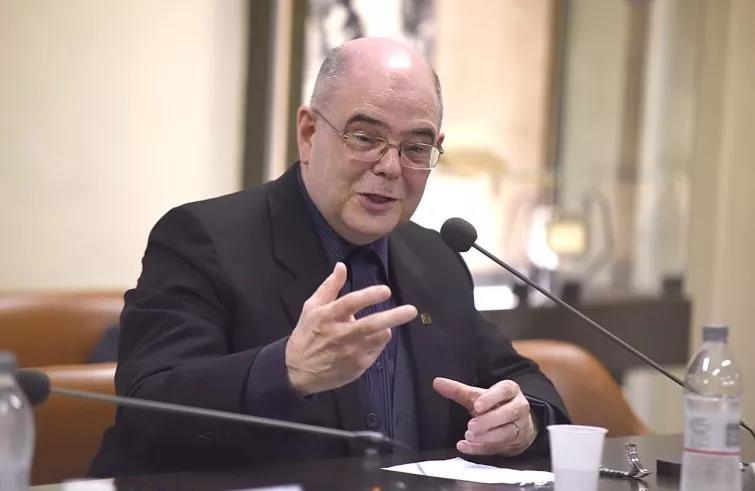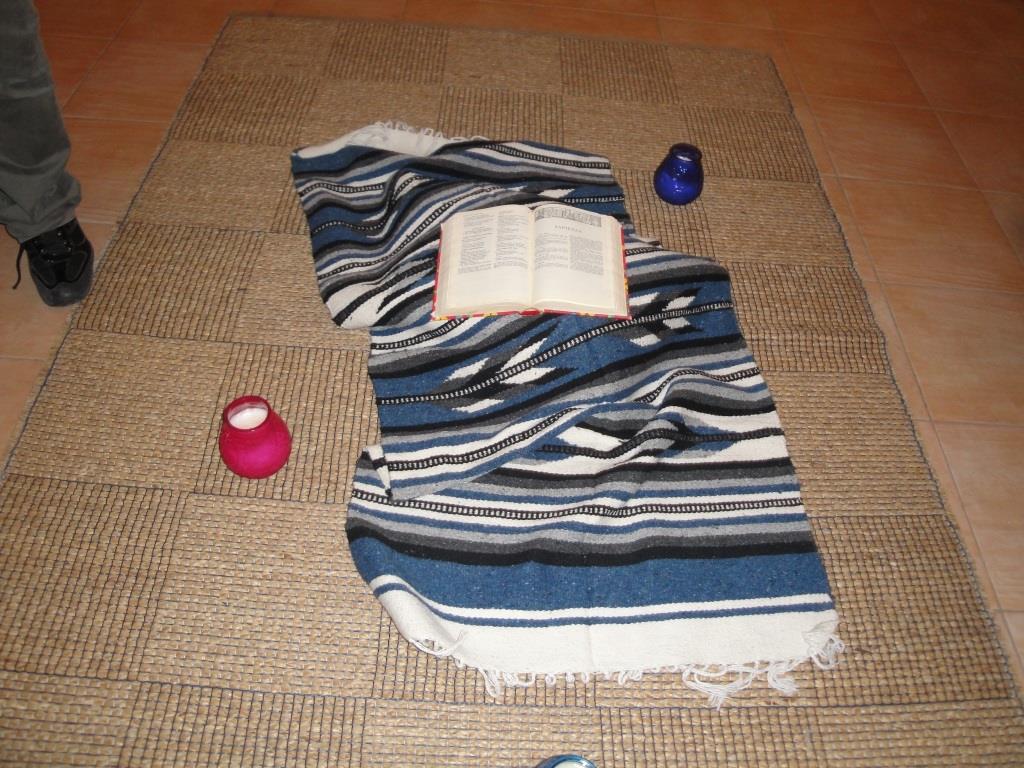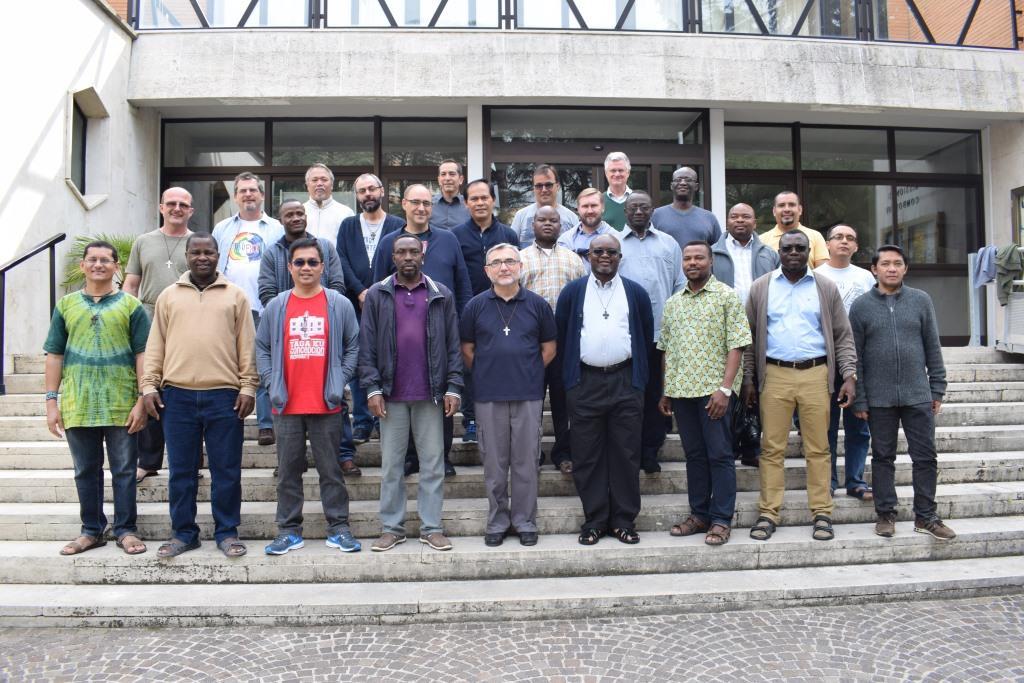Daniel Comboni
Comboni Missionare
Institutioneller Bereich
Andere Links
Newsletter
Monday, March 5, 2018
On January 25, 2018, Fr David Kinnear Glenday MCCJ, secretary general of the Union of Superiors General, addressed the General Assembly of the Union of the Catholic Apostolate of the Pallottine Family. The text that follows is a transcription of his remarks. “This event of your General Assembly – said the Comboni missionary – is a moment above all for getting to the essentials. Our prayer and our desire is that the Lord will lead us to what is essential, to what is the heart of his call for the Union at this time. We ask the Lord to help us let what is secondary, what is peripheral, fall gently away, so that we are left with what is essential and vital and most life-giving. And I suppose that we have to say for us, disciples of Jesus, what leads us to the essential is the Gospel, the Good News, his Word.”
The service of joy:
promoting communion and collaboration
This event of your General Assembly is a moment above all for getting to the essentials. Our prayer and our desire is that the Lord will lead us to what is essential, to what is the heart of his call for the Union at this time. We ask the Lord to help us let what is secondary, what is peripheral, fall gently away, so that we are left with what is essential and vital and most life-giving. And I suppose that we have to say for us, disciples of Jesus, what leads us to the essential is the Gospel, the Good News, his Word. That is why I want to start with his word, with Luke 10:17ff.
It’s when the seventy or seventy-two return, so in a way, it’s what you are living.
And Luke tells us: “The seventy-two came back rejoicing. ‘Lord’, they said ‘even the devils submit to us when we use your name.’ He said to them, “I watched Satan fall like lightning from heaven. Yes, I have given you power to tread underfoot serpents and scorpions and the whole strength of the enemy; nothing shall ever hurt you. Yet, do not rejoice that the spirits submit to you; rejoice rather that your names are written in heaven.” It was then, that filled with joy by the Holy Spirit, Jesus said, “I bless you, Father, Lord of heaven and of earth, for hiding these things from the learned and the clever, and revealing them to mere children. Yes, Father, for that is what it pleased you to do. “Everything has been entrusted to me by my Father. And no one knows who the Son is except the Father, and who the Father is except the Son and those to whom the Son chooses to reveal him.” And then turning to his disciples Jesus spoke to them in private, “Happy the eyes that see what you see. For I tell you that many prophets and kings wanted to see what you see and never saw it, and to hear what you hear and never heard it.”
I would like to invite you to notice how Jesus responds to the apostolic joy of his disciples. He welcomes it, he appreciates their joy, he affirms it, he gives them reasons to be even more joyful, he purifies their joy (Rejoice rather..., not Don’t rejoice; let your joy be deeper, more solid, complete). And then most wonderful of all, he himself rejoices. It’s the joy of the apostles, the disciples, which sets Jesus on fire with joy. That’s the Jesus who is here with you in these days. If you want a title for what I will say to you, it would be: Celebrating the joy of communion.
What I want to share with you, which is really only a beginning of what you will share with each other later in the morning, is intended to be a reply to the question, “So Lord, what does it mean to celebrate the joy of communion, the joy of collaboration”. That is what Jesus is rejoicing about here. He sent them out 2 by 2, not 1 by 1, so Jesus is celebrating the fact that they lived and achieved their mission in communion, and I would like to share with you 3 or 4 verbs – I much prefer verbs to nouns – nouns are a bit flat – verbs move. I think verbs are more proper to an apostolic community than nouns. Verbs are open-ended. So what does it mean to celebrate the joy of communion and collaboration?
First verb: to remember. Pope Francis says the disciple fundamentally is a person who remembers. So to remember first of all the origins, the origins of your Union, which of course were in the heart of this man Vincent Pallotti, young man, died young. To remember with wonder, to regain wonder, awe, merveille, meraviglia, awe – I like the English word ‘awe’, because in order to say ‘awe’, you have to look surprised – ‘Awe’! To remember as something wonderful, as something unnecessary, as something surprising, as something new, what happened in the heart and mind and life of St. Vincent Pallotti. To remember your origins, but to remember your origins also in a very personal sense: how did you get involved in all this? What is your story of Union? What drew you into the Pallottine Family? That is also something totally surprising, totally unexpected. It’s important to regain and to deepen that sense of wonder about our origins. When I tell the story of my becoming a Comboni Missionary....! My father was a Scottish Presbyterian, and then at 71 years of age he decided himself to becoming a Catholic – at 71! My mother was an Irish Catholic – they met in India and I was born in India – in Bombay – and when I was 3 we moved to settle in Scotland – and when I was 7 I decided firmly that I wanted to be a missionary, and when I was 8, I said it’s high time I decided what congregation I’m going to – you could call this slightly precocious. I took the Universe, the Catholic paper, and saw the advertisements for several congregations, and wrote 5 letters: Dear Father, please send me information about your congregation. But Mum that day, and the letters had to leave that day according to me, had only 2 stamps, and I put one of the stamps on a letter to the Comboni Missionaries, and here I am! I posted the letter in Scotland on Sunday afternoon and I had a reply from London on Tuesday morning, so even the British Postal Service collaborated in the origins of my vocation. So, remember origins, but then, remember story, and I would say, remember above all the story of new beginnings. Fortunately or unfortunately – I don’t have a deep knowledge of your history – but if you are human beings, and I see that you are, you will have had ups and downs – that’s just part of life. But remember the new beginnings. Remember how the gift of the origins has been a gift of new origins again and again. And the proof of this is that you are here. And once again, the invitation is to do this vis-a-vis the history of your Union, the history of your various formations , but also of you personally. Your personal history of new beginnings. By that I mean those moments, inevitable, of discouragement, failure, fragility – you get the idea. But here you still are – and that is the Resurrection of Jesus working today in your flesh and in the flesh of your Union. So the first verb was to remember, which in Italian, is ricordare, which is very beautiful, to bring again to my heart, but also remember is very beautiful because it means to put together in a new way, to remember. And especially to find the place of those “members”, those moments, which we have forgotten or excluded.
I must say, that recently I celebrated the 40th anniversary of my priesthood. And it has been a season of wonderful gratitude as a gift. Remembering things that I thought I’d forgotten, or remembering things which were with me but remembering them in a new way.
The second verb, for celebrating, is to discern. By discern here I mean pay attention. I saw the programme of your day yesterday and I can only wonder and marvel that you survived. But I heard that you survived peacefully! The thing is, what remained with you of all that you heard yesterday? Where did your heart respond? Where were you moved? What stood out for you? What spoke to you? What gave you joy? Because yesterday you really lived what we heard in the Gospel: the 72 came back. And the Lord in this Gospel challenges us to take what you shared yesterday to heart. And to affirm it and appreciate it and develop it. Isn’t it true to say that growth in the Spirit is often growth in paying attention to the action of the Spirit in the present? So what we’re saying is that yesterday provided you with much precious material: the lives of people, the stories of people, the adventures of people, in this wonderful “Catholic” context. There is something between Pallotti and my founder, St. Daniel Comboni. One of his favourite words, too, was ‘Catholic’, universal.
A third way of celebrating the joy of communion and collaboration is to desire. It’s very important to notice the good desires that are being born in us and being inspired in us, because very often, that is how the Spirit works. Isn’t that the story of Vincent Pallotti, a man burning with desire to reach people, to bring people together. St. Augustine of Hippo used to say that the art of God is to attract, not to give kicks in the pants, to push, but to attract. So what is attracting you in the vision of Pallotti at this time? Where do you experience the Spirit drawing you forward. And, in a way, a confirmation of the importance of desire is that as soon as a good desire appears in our hearts, a little voice pipes up saying “Who do you think you are to have such a good desire? Don’t you know that you are weak, that you are a sinner?” And that little voice, we know where it comes from, and it confirms to us that our desire is really dangerous, in the best possible sense. So we need to discern because, for sure, the Holy Spirit, who raised up Vincent Pallotti, and raised him up leading him forward through desire, is now doing the same for you and with you and through you for the many, many people who form part and will form part of this Union. So, I’m suggesting that part of the prayer, part of the sharing, part of the reflection of these days should be a quiet listening together to this life-giving desire. And don’t be intimidated by the fact that there will be a serious disproportion between the desire and your reality. This is bound to be the case, it is the Holy Spirit that we’re talking about. Of course the desire will be – and this is part of the problem with our founders – they leave us such a huge project that we hardly know where to start. But we shouldn’t be intimidated about that - that must be the case. If a desire is too much to measure to us, we could be suspicious if it comes from the Holy Spirit or not. We have to see, step by step. Another way of putting this is: What doors is the Spirit opening for you at this time? Apoc 3:8 I have opened a door before you which no one can shut. What are the doors that the Spirit is opening before you?
So we said to remember, to discern, to desire, and the fourth verb - there are five you know – I want to give you hope that I will finish eventually! – (Let me tell you a little story: Timothy Radcliffe, the former Master of the Dominicans, tells the story of a Dominican confrere who was invited to speak in the US, and he gave his talk, he did his best, but when he sat down, the response was tepid, there wasn’t much applause – I’m not looking for applause you know! – and so the poor Dominican turned to the moderator and said “Oh, I’m sorry, it doesn’t seem to have gone so well father”, and the moderator said “Don’t worry, father, I’m not blaming you, I’m blaming the people who invited you”!)
The next verb, the penultimate verb, is to serve, to serve joy. In a way, this is an invitation I would like to offer you: to conceive, to dream, to understand, at least in some way, the future of the Union as that of a Union which serves the joy of God’s people. And the Gospel image that comes to me to share with you here is the image of the sower: sow joy! A beautiful explanation of the parables of the sower and the seed (Mt 13 and parallels) is that they are the fruit of Jesus’ conversation with the Father. We know that Jesus, during his ministry, regularly took time to speak with the Father. And for sure he spoke about what was happening in his ministry. And for sure he reported to the Father: Father, our plan is so beautiful, so loving, so kind, and people are wanting to kill me. Is this the plan? And the parables of the sower are Jesus sharing with us his Father saying, Jesus – yes – but trust me, I’m guaranteeing the harvest, I’m with you. And this means that to serve joy, means to go out, uscire, salir, as Pope Francis would say. For sure, a moment like this is a moment of new departure. There is a famous number in Evangelii Gaudium, n. 47 or 48, uscire, uscire, go out, go out – and he says – you want to know what I like – I prefer a Church which is wounded and dirty and hobbling along – that has gone out – than a Church which is at home and has all the papers in order and stops working when 5 o’clock comes. The sower sows; he doesn’t say, what kind of soil is this? No, to sow generously. To wait, to wait, that’s an awfully important verb: aspettare, attender, esperar. Il faut savoir attendre! Pope Francis says, “Time is superior to space”. What does he mean? He means, when I face an apostolic challenge, or an apostolic discernment, my question is not “How can I occupy all the space, how can I be everywhere”? No, my question is “How can I put in place processes which will grow in time. To have trust in time”. Time is God’s ally. And he often says this to religious families. So maybe that is an important question also for your own planning, your own way of conceiving the future. Don’t want to answer all the questions, to be in all situations, but what are those 2, 3, 4 initiatives to get something started and then we see how it goes. I suppose it’s the freedom to experiment which, from the little I know of Pallotti, was there; in fact, maybe one of your problems with Pallotti is that he started many things, he started so many things, and here you are today.
The fifth and last verb is to console. Console my people, Isaiah 40. What do I mean here? As the one person here who so far has not been involved in the Union of Catholic Apostolate, I want to say that you are a gift for us all, and you have within you the grace of being a consolation in the deepest sense for so many people. So, it’s an invitation to be aware of your apostolic potentiality, of the good you can do, of the good you can be, of the beautiful name that you bear: Union, Catholic, Apostolate. It’s a whole programme for years to come. When Pope Francis went to the General Chapter or Congregation of the Jesuits, he asked them to do three things, and I just want to mention the first. He asked them, actually Ignatius asked them, always ask the grace to be in consolation. And Francis says, Why? Because it’s the sign of the presence of the Risen Lord. Second, can we announce the Risen Lord con rostro de Cuaresma?
Third, remember that when you are in desolation, it’s the antechamber of consolation. Sadness is never the Lord’s last word. And maybe this is the vocation of all of us in our little humble way: to help our brothers and sisters to find that place in their heart where the Spirit awaits them. And that will be the place where they find real joy.
Fr David Kinnear Glenday MCCJ




